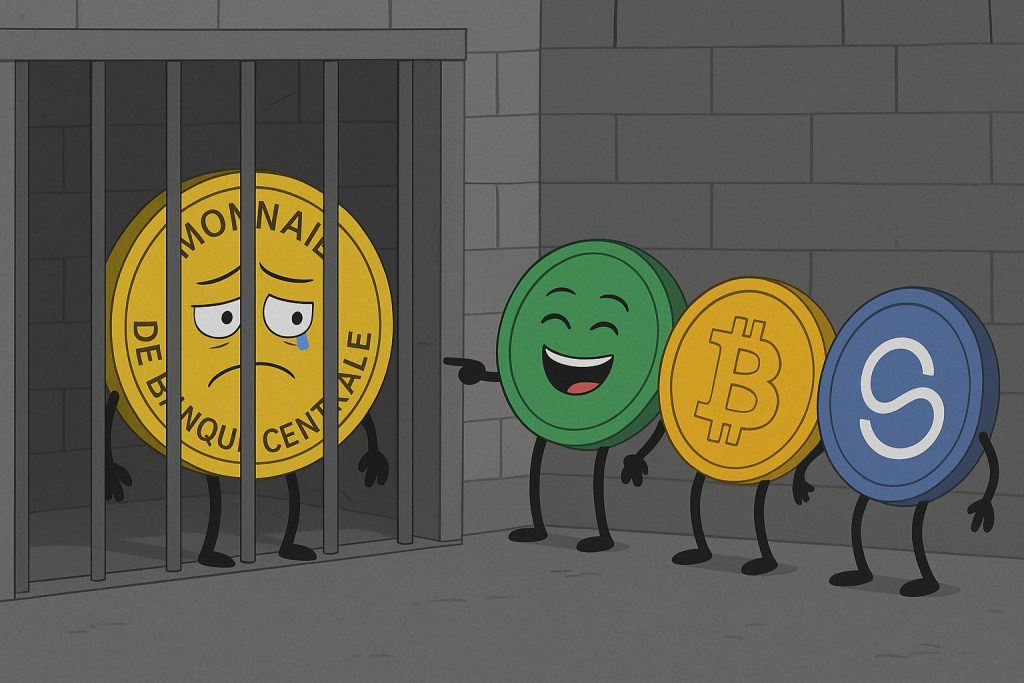US Congress Blocks Fed from Issuing a CBDC in 2025: A Win for Private Stablecoins
In a landmark move, the US Congress has effectively barred the Federal Reserve from developing a central bank digital currency (CBDC) for public use, embedding the prohibition within the must-pass National Defense Authorization Act (NDAA). This strategic decision signals a clear preference for private-sector stablecoins, as evidenced by the simultaneous advancement of the GENIUS Act to regulate them. The debate, fueled by privacy concerns and political maneuvering, positions the US against global CBDC trends—opting instead for decentralized innovation. Here’s a deep dive into the implications, key players, and what it means for the future of money. --- ### Why Did the US Congress Block the Fed’s CBDC Plans? The House of Representatives snuck an anti-CBDC clause into the NDAA, a 1,300-page defense funding bill, making it nearly impossible to veto without jeopardizing military budgets. Critics, led by figures like GOP Whip Tom Emmer, argue a public digital dollar would grant the government Orwellian surveillance powers. *"Attaching our Anti-CBDC Surveillance State Act to the NDAA ensures unelected bureaucrats can’t trade financial privacy for a CCP-style tool,"* Emmer tweeted on July 17, 2025. The Fed can still explore CBDCs for institutional use, but retail access is off the table—for now. --- ### How Did Political Battles Shape This Outcome? This wasn’t a spontaneous move. Republicans have long framed CBDCs as threats to liberty, while Democrats narrowly supported exploratory efforts. The House’s 219-210 vote in July 2025 teetered on partisan lines. To avoid Senate gridlock, anti-CBDC lawmakers negotiated a marathon 9-hour debate, trading support for crypto reforms (like clearer stablecoin rules) for the NDAA amendment. *"It’s a classic DC horse-trade,"* quipped a BTCC analyst. *"Privacy fears trumped centralization dreams."*  *Source: CIMG* --- ### What’s the GENIUS Act, and Why Does It Matter? While killing the Fed’s CBDC, Congress greenlit private alternatives via the GENIUS Act (passed earlier in 2025). This law mandates consumer protections for stablecoins like USDT and USDC, requiring audits and reserve transparency. *"The US is betting on competitive innovation, not state-controlled money,"* noted CoinMarketCap data. Unlike China’s digital yuan—already piloted in 23 cities—America’s approach mirrors its tech ethos: *"Build it privately, regulate it lightly."* --- ### Could This Decision Backfire? Privacy advocates cheer, but critics warn of fragmentation. *"Without a Fed CBDC, we’re ceding the future to corporations,"* argued Sen. Elizabeth Warren. Meanwhile, the EU races ahead with plans for a digital euro, potentially leveraging ethereum or Solana. The US stance also risks complicating global payments; SWIFT’s 2025 report flags CBDCs as *"inevitable for cross-border efficiency."* --- ### What’s Next for Crypto Markets? Stablecoin issuers like Circle (USDC) and Tether (USDT) stand to gain, with TradingView showing a 7% uptick in stablecoin trading volume post-NDAA news. However, the Senate must still approve the NDAA—though its military ties make rejection unlikely. *"Markets hate uncertainty, but they love private-sector wins,"* observed a BTCC trader. --- ### FAQ: Your CBDC and Stablecoin Questions Answered
Key Takeaways
Is the Fed’s CBDC completely dead?
Not entirely. The NDAA blocks retail CBDCs, but the Fed can still research wholesale (bank-to-bank) versions. Private-sector projects remain fair game.
How does this affect Bitcoin and Ethereum?
Indirectly. The focus on private money reinforces crypto’s decentralized ethos, but regulatory clarity for stablecoins could reduce volatility for BTC/ETH pairs.
Will the US dollar lose global dominance?
Unlikely short-term. The dollar’s 58% share in global reserves (per IMF 2025) buffers against CBDC rivals—for now.

